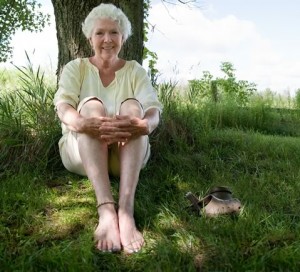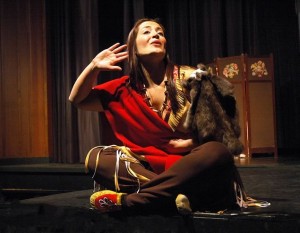Dinah Christie: Popcorn, Pauline & Skinny Dipping
The producers were stunned. “I told them I’m buying a farm. I didn’t realize at 28 I was just supposed to be having fun.”

On the cusp of her seventh decade Dinah Christie has recently come out of retirement. Photo by Rosemary Hasner.
My enduring image of Dinah Christie will not be of the gorgeous sometimes-blonde who sang Mavor Moore’s satirical songs for CBC’s controversial current affairs program in the 1960s, This Hour Has Seven Days, or who played Tom Kneebone’s zany sidekick in Noel Coward reviews in the seventies, or who so elegantly hosted four years’ worth of Senior Star, a talent search for over 65ers on Vision TV. No, my image of Dinah Christie will be of a silver-haired, towel-wrapped femme d’une certaine age, wearing ankle bracelets and crocs, toting a large blue recycling bin on wheels up her farm lane to the verge of her Southgate concession road.
Walking into Dinah’s kitchen is like walking into a scrapbook of her life: newspaper clippings, invitations to openings, posters of past shows, a mandolin in the rafters, photos of famous friends plastered from floor to ceiling. Finding the doorknob can be a challenge.
“I made us some popcorn,” she says at 9:30 in the morning. “With Parmesan cheese instead of salt.” We quickly agree salt is one of the world’s great pleasures and, I am to learn, also a soporific. If you can’t sleep, dip your finger twice in the saltcellar and settle down for the night.
On the cusp of her seventh decade Dinah has recently come out of retirement, brought back to the stage in June for the first time in almost seven years for a benefit at the Mount Forest United Church to raise funds for North Wellington’s HOPE Committee to destigmatize mental illness, one of an armload of charities to which she lends her name.
“You have to give back, because I don’t have lotto money to give away. If I won five million, it would be gone” to art galleries, theatre productions and other good causes, such as Dufferin County Museum and Archives.
Dinah is on the billboard at the museum twice this fall. Her play Paddle Song, about the life of Pauline Johnson, takes place on September 29, featuring Cheri Maracle as the Mohawk poet. And on October 27, Dinah takes the stage herself for a one woman evening of song, story and certainly humour. “I’ve come to place of seniority where I can get away with things on stage,” like rapping about crop circles and writing a tribute to cremation. “I do it to make people laugh. It’s more important to me than anything because I know implicitly the healing ability of laughter.”
She’s had her own showdown with depression. “Half the people I know in and out of the entertainment business are clinically depressed. I remember making a choice to fight it, and along the way I’ve learned to be helpful to others,” she says as she passes the popcorn. It’s also part of the reason why she’s lived on a farm east of Holstein for the past 40 years with her photographer husband Robert Warren. “This is a free, sensible, sane way to live. I can’t tell you how difficult it would be for me to live in the city.”
In 1971 Dinah was having lunch with producers at the tony Toronto restaurant Three Small Rooms when she asked for a phone to call her real estate agent. The producers were stunned. “I told them I’m buying a farm. I didn’t realize at 28 I was just supposed to be having fun.” Raised in Toronto and Stratford, she’d wanted to live in the country since she was a girl travelling back roads on weekends with her father, actor Robert Christie, and sister Cedar, searching for a barn to use as a theatre.
“I’d just finished nine months off-Broadway in Your Own Thing, a rock musical of Twelfth Night which was too much fun, but after a New York autumn, winter and spring, I was ready to make the jump. I was in Stratford doing The Satyricon and I could see a year and a half of solid work ahead in bits and pieces, so I wasn’t totally insane.” (A ten-year gig on CHCH-TV followed, in a furiously-paced charades show called Party Game.) With a thousand dollars borrowed from two sympathetic bankers, she signed the papers and then went off to England to tour with a show for the British Tourist Authority. That’s where she met the handsome young photographer from Montréal. “Bobby had no idea who I was except I was a landowner.” It was pretty much love at first sight and they’ve been together ever since.
It helped that he was tremendously handy, especially in those early days. The farm had been settled in 1832 and the little clapboard house was barely standing. Dinah remembers saying, “‘Honey, I need a little more light in the east window.’ Bobby came with a chainsaw and started cutting through the drywall. Suddenly, he stopped and yelled, ‘Come quick! It’s log!’ We spent the next six years chinking.”
Now that Parkinson’s disease has made mobility difficult for her husband, the farm is even more important to the couple. They have good friends to call on and the serenity of country life to inspire Dinah’s writing. “I have an intimate relationship with the trees and the water here.” And the crows.
“Two winters ago it was wet, cold and frozen, and the crows couldn’t get through to anything on the ground.” An English friend gave Dinah two cartons of eggs and a Black Forest ham – here Dinah turns on a Cockney accent – “Those eggs are off, Ducky, and that ham too. You take them.” So she wrangled her biggest frying pan, whipped up a massive ham omelette and laid it out on a cedar rail for her starving crows. “They came and obviously thought this woman is mad, but we’ll keep eating her food.” They check in the same time every day. Caw! Caw!
For Dinah Christie “retirement” is a relative term. She has 29 produced plays to her credit and many more stuffed in a desk drawer. Paddle Song, recently revived, portrays the life of E. Pauline Johnson. The poet and performer lived only 51 years from 1861–1913, but for 17 of them was a stage sensation across Canada, the U.S. and Great Britain. The enduring imagery of her best-known poem, “The Song My Paddle Sings,” was required memorization for an earlier generation of Canadian schoolchildren.

Cheri Maracle, who regularly portrays “the Mohawk Princess” in Dinah Christie’s play Paddle Song, electrified audiences when she performed “The Cattle Thief” at the Six Nations All-Star Showcase at the Metro Toronto Convention Centre in July. “I was so proud to portray Pauline Johnson in front of my own people,” she says. Photo by Robert Warren.
“Pauline and I are kith and kin,” says Dinah as we move on from popcorn to lemon pie. “She died the day my father was born. We met through her writing when I was 13. I’ve been a water person all my life and, if we had met, we’d have been a giggling mass in a canoe somewhere, talking about what we liked most in life.” Today Dinah attributes her inspiration for the play to Pauline’s formidable presence. “Things have a way of happening for this production and I have to think Pauline is behind them.”
Dinah wrote the play years ago for her old friend Tom Kneebone who was then artistic director of Smile Theatre, a touring company that brings original Canadian musicals to seniors’ centres in the GTA. In fact, one of Dinah’s earliest and most popular collaborations with Tom and Smile, The Light in Winnie’s Window, a war bride musical, was performed in 1995 in the newly opened Dufferin County Museum. Her latest for Smile, Lavender Blue, is about a young New Brunswick woman who dressed as a man to serve in the American Civil War.
Dinah rewrote Paddle Song in 2009 when Tom Hill, curator of the Woodland Cultural Centre, mounted a retrospective of Pauline Johnson’s life in her home territory of the Six Nations of the Grand River.
“I’d been to Six Nations many times when I wrote a play on Tom Longboat, the Onondaga marathon runner, and had always been warmly received there. But when Paddle Song played in an 800-seat theatre to an audience representing every persuasion, it was the young First Nations girls who came running to me afterwards to introduce themselves and thank me. Those young girls knew right away that there were real stories out there about their people that just needed to be presented, and they wanted to connect with that force.”
That force is captured by Mohawk actor Cheri Maracle who eloquently portrays Pauline’s presence on stage in both buckskin and ball gown to illustrate Johnson’s dual heritage.
Pauline’s mother was an educated English woman. Her father was a member of the Mohawk Wolf Clan who spoke English, French and German, as well as his traditional language, wore conventional Canadian dress and entertained the who’s who of the day at his estate, Chiefwood, on the Grand River. Pauline was a frail child, home-schooled and privileged, who spent a lot of alone time in her canoe. When her father died unexpectedly, her mother couldn’t keep up the estate, and with no marriage prospects, Pauline turned to her writing to earn a living.
Then as now, there wasn’t much money to be made in the theatre. Dinah knows. Her early memories are of her famous father practising Shakespeare. He spoke the first words ever on the Stratford Festival stage, a welcome written by Tyrone Guthrie. As a teenager in Stratford, Dinah had her first theatre job getting coffee for the Festival production crew and one dangerously charming leading man, Christopher Plummer. “I may be the only woman he’s met who hasn’t succumbed to his charms!”
Dinah Christie was making a living on stage, television and radio in Canada long before Hollywood North. If it was tough then, she insists it is eight times tougher for young performers today because there is no money. “That’s why I write one-hour musicals, so we can afford to pay one or two artists…[but then] why would the arts get money when governments underfund children’s mental health programs?”
So what’s to be done? Carry on, do your best, she’d say. What’s next? A memoir? “It’s probably the last thing I would like to spend valuable time on.” She might finish a children’s hockey book she’s been chipping away at for 38 years, but right now her priority is keeping her husband comfortable and living in the moment.
That said, it’s hot. We’ve chased our popcorn and lemon pie with well water, the recycling bin is out, and it’s time to visit the pond for a midday skinny dip. Pauline would approve.
More Info
Pauline Johnson: A poet ahead of her time
Dinah Christie loves Pauline Johnson for her intelligence, courage and foresight. “She was well ahead of her time.”
Imagine an Indian woman in 1907 dressed in fringed deerskin adorned with feathers, fur and scalps, standing under a Chautauqua tent in front of a Midwestern American audience expecting a pleasant recitation and perhaps a gentle war whoop or two.
Instead they are met with the fierceness of one of Pauline Johnson’s most political poems, “The Cattle Thief.” The poem builds to the last stanza which must have gobsmacked her audience.
You say your cattle are not ours, your meat is not our meat;
When you pay for the land you live in, we’ll pay for the meat we eat.
Give back our land and our country, give back our herds of game;
Give back the furs and the forests that were ours before you came;
Give back the peace and the plenty. Then come with your new belief,
And blame, if you dare, the hunger that drove him to be a thief.”
Cheri Maracle, who regularly portrays “the Mohawk Princess” in Dinah Christie’s play Paddle Song, electrified audiences when she performed “The Cattle Thief” at the Six Nations All-Star Showcase at the Metro Toronto Convention Centre in July. “I was so proud to portray Pauline Johnson in front of my own people,” she says.
Paddle Song, written by Dinah Christie and starring Cheri Maracle,plays twice at Dufferin County Museum and Archives on Saturday, September 29 at 5pm and 7pm, with a reception between performances at 6pm.
Dinah Christie performs her one-woman, one-hour review at the museum on October 27 at 7pm.
Tickets for each show are $20, with proceeds to support DCMA’s efforts to make collection information available and searchable online. Reserve at 1-877-941-7787.











